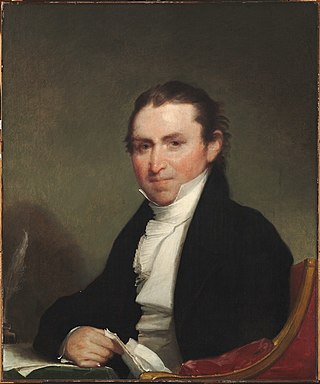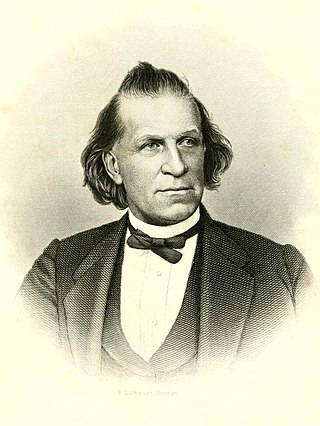George Lunt.
George Lunt.
George Lunt.
Notes
- ↑ Cooper, James F. John Paul Jones (1846) Carey and Hart (via Naval Historical Center)
- 1 2 3 Lawrence S. Mayo (1961). "Lunt, George". Dictionary of American Biography . Vol. VI, Part 1. New York: Charles Scribner's Sons. pp. 507–8.
- ↑ Evert Augustus Duyckinck; George Long Duyckinck (1856). Cyclopaedia of American literature. C. Scribner.
Related Research Articles

George Stillman Hillard was an American lawyer and author. Besides developing his Boston legal practice, he served in the Massachusetts legislature, edited several Boston journals, and wrote on literature, politics and travel.

Robert Charles Winthrop was an American lawyer, philanthropist, and Whig Party politician who represented Massachusetts in the United States House and Senate from 1840 to 1851. He served as the 18th Speaker of the United States House of Representatives and was a political ally and colleague of Daniel Webster. After a rapid rise in Massachusetts and national politics and one term as speaker, Winthrop succeeded Webster in the Senate. His re-election campaign resulted in a long, sharply contested defeat by Charles Sumner. He ran for Governor of Massachusetts in 1851 but lost due to the state's majority requirement, marking the end of his political career and signaling the decline of the Massachusetts Whig Party.

John White Chadwick was an American writer and clergyman of the Unitarian Church.

John Henry Clifford was an American lawyer and politician from New Bedford, Massachusetts. He served as the state's attorney general for much of the 1850s, retaining the office during administrations dominated by three different political parties. A Whig, he was elected the state's 21st governor, serving a single term from 1853 to 1854. He was the first governor of Massachusetts not born in the state.

Evert Augustus Duyckinck was an American publisher and biographer. He was associated with the literary side of the Young America movement in New York.
Charles Jackson was an American jurist based in Massachusetts.

John Lowell Jr. was an American lawyer and influential member of the Federalist Party in the early days of the United States of America.

Theodore Trapplan "Tappan" Michael Wentworth was an American lawyer and politician who served one term as a U.S. Representative from Massachusetts from 1853 to 1855.

Alfred Thompson Bricher was an American painter associated with White Mountain art and the Hudson River School.
Joseph Barker Stearns (1831-1895) was the inventor of the duplex system of telegraphy.

Joseph Tinker Buckingham was an American journalist and politician in New England. He rose from humble beginnings to become an influential conservative intellectual in Boston.

Robert Carter was an American editor, historian and author. He was involved in the formation of the Republican Party.

Thomas Green Fessenden was an American author and editor who worked in England and the United States.
Frederic Thomas Somerby or F.T. Somerby (1814–1871) was a painter and "sporting writer" in Boston, Massachusetts, in the mid-19th century. As an author he contributed to Spirit of the Times. He also worked as a decorative painter and kept a studio in Cornhill (ca.1848-1869); clients included the Nantucket County Whigs. Examples of artwork by Somerby reside in the collection of Historic New England.

Charles Thomas Main was an American mechanical engineer and business executive, who worked for New England textile mills, and also in the then new field of hydroelectricity. He is known as founder of Charles T. Main, Inc., and as president of the American Society of Mechanical Engineers in the year 1918-19.
Samuel Lorenzo Knapp was an American author and lawyer.

Elias Nason was a Massachusetts Congregational clergyman, educator, editor and author.

James Kendall Hosmer was an American (Union) soldier during the American Civil War, a pastor, library director, historian, author and a professor of history and literature. Members of the Hosmer family fought in the French and Indian War, American Revolution and the Civil War. As a pastor of the First Church in Deerfield, Massachusetts he left the ministry, feeling duty bound to join the U.S. Army to serve in the Civil War, insisting to serve at the front, where he participated in several major campaigns. As an author and historian he later wrote and published several works about and involving the Civil War and how he viewed the cause of both the North and South. He also authored a number of other works relating to early American history, along with several novels and a fair number of poems. Hosmer also reviewed and published accounts about the Lewis and Clark Expedition at a time when full accounts of the expedition were very few in number and out of print. During his career he corresponded with many prominent writers and historians involving his works. In his latter life he held several prominent positions in various literary associations, including his position as president of the American Library Association.

William Stevens Robinson was a United States journalist.
The Boston Courier was an American newspaper based in Boston, Massachusetts. It was founded on March 2, 1824, by Joseph T. Buckingham as a daily newspaper which supported protectionism. Buckingham served as editor until he sold out completely in 1848, after suffering a severe financial crisis in 1837 and losing much of his editorial authority. The Boston Courier supported the National Republicans, and later the Whig Party. In the period before the American Civil War, its editors, including George S. Hillard and George Lunt, supported the states' right position on the abolition of slavery. From 1867 to 1915 the Boston Courier was a weekly newspaper published by Libbey & Dennison.
References
- Wilson, J. G.; Fiske, J., eds. (1900). . Appletons' Cyclopædia of American Biography . New York: D. Appleton.
External links
-
 Works by or about George Lunt at Wikisource
Works by or about George Lunt at Wikisource - Works by George Lunt at Project Gutenberg
- Works by or about George Lunt at the Internet Archive
- In 1879 Henry Tucker wrote the song, "Mabel " using the lyrics from Mr. Lunt's poem At the Gate.
George Lunt | |
|---|---|
 | |
| United States Attorney for the District of Massachusetts | |
| In office 1849–1853 |